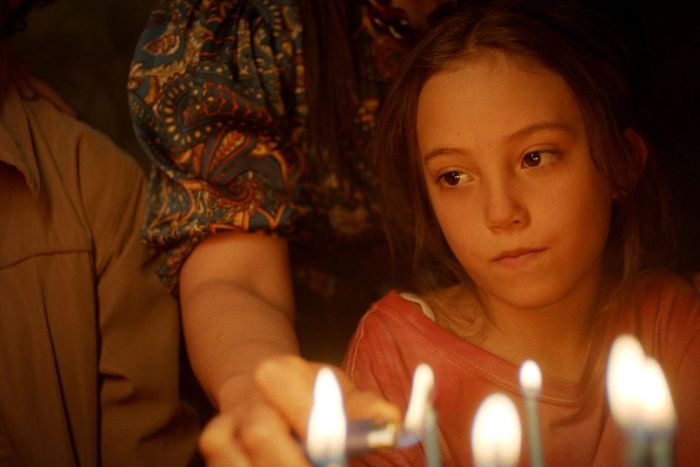
Naíma Sentíes, the first timer who plays seven-year-old Sol in Tótem, has the bright, animated face of a kid who can’t help but broadcast whatever she’s feeling in the moment. She gives the unforced performance of a child rather than a child actor, which also means that when her face does go still, you can see her thinking. Over the course of the single day in which Lila Avilés’ extraordinary family drama unfolds, Sol grapples with something immense that she was already aware of in the abstract but has started to accept as an imminent reality. The girl’s family has gathered in her grandfather Roberto’s (Alberto Amador) house to throw a birthday party for Sol’s artist father, Tona (Mateo Garcia Elizondo), who has cancer. Though no one says as much out loud, the celebration is doubling as a goodbye, and you can almost feel the heat coming off of Sol’s head as her brain whirls around the idea of mortality. Disappearing into her late grandmother’s ceramics studio to get some time alone with a purloined phone, she asks Siri when the world will end. The answer she gets, that the Earth will be consumed by the Sun when it becomes a red giant millions of years from now, doesn’t seem to be what she’s seeking.
It’s tough to be a kid who’s losing someone so important to her, though it’s not like any of the adults eddying around Sol are faring much better. Avilés’ feature debut was 2018’s The Chambermaid, an austere film that tracked a woman’s semi-invisible labor at a luxury hotel in Mexico City. Tótem, her follow-up (and Mexico’s Oscar submission), is also set in a single location, but is stylistically very different — a warm, tumultuous ensemble picture that leaves Sol for long stretches to check in on the many people in her orbit. It’s in the vein of party films like Monsoon Wedding and Rachel Getting Married, though here the family is divided on the wisdom of even throwing the event they’re all trying to help with. Aunt Alejandra (Marisol Gasé), who’s introduced doing a hasty touchup dye job she’s forced to rinse off in the kitchen sink (the bathroom being occupied) has been pushing for the party, though they can barely afford it, having funneled all their money into Tona’s treatment. Her sister Nuri (Montserrat Marañon) doesn’t want to accept Tona’s decision to choose palliative care over chemotherapy, and stews in alcohol and resentment while baking a cake and getting ready with her daughter Esther (an adorable Saori Gurza, toting a scene-stealing kitten). Roberto, a therapist, sees a patient and works on his bonsai, and from time to time emerges to glare at the pandemonium in his home.
Tona, though, stays in bed in the shrouded room where his mother also spent her dying days. Played by a skeletal Elizondo, he’s in obvious agony, and is being tended to with heartbreaking care by his nurse Cruz (Dos Estaciones’ Teresita Sánchez). In one of Tótem’s most poignant scenes, Sol confesses to Cruz that sometimes she thinks her father doesn’t love her, because she’s so often turned away from seeing him. But when she does get to visit him, and her mother Lucia (Iazua Larios) returns to join them, we see just how close the trio are in a scene where Tona’s presented with a birthday gift. The film, which was shot by Diego Tenorio, uses long, fluid takes that don’t always follow the action but sometimes linger on observers, and in that sequence, his lens might as well be an embrace as Sol watches her parents together. Tótem is as tender with its characters as it is grounded by them, and in 95 minutes, spins out a whole lifetime for its family without relying on exposition, delineating the upper middle class older generation, their freewheeling offspring, and their own children, who absorb much more from the grown-ups in their lives than those grown-ups are always aware of. Every once in a while, the film verges on the antic — like when Sol and Esther briefly make off with the electrolarynx Roberto uses to speak — but more often it proceeds by seeding details, like Nuria’s buzzed haircut or Sol placing snails on the painting in the hallway, that pay off in powerful ways later.
The gathering itself arrives like a punch, friends and family suddenly all gathered under fairy lights for reminiscences and toasts and private arguments, and Tona tamping down his suffering to smile and enjoy their company one last time (“Let’s go for the 27th round, Rocky,” Cruz murmurs to him as they emerge, as though her fragile charge were a prizefighter striding out to a match). The marvel of Tótem is that it feels so organic though it’s clearly the result of an enormous amount of preparation and precision, the camera winding its way through crowded spaces to catch the most delicate of interactions. It overflows with love and pain, sometimes both intertwined, and it’s openhearted about death existing alongside life in a way that feels rewardingly mature, even if its protagonist is a child. But the best compliment that can be paid to Tótem is that it’s a film that you genuinely don’t want to end. Not just because of what’s waiting for its characters, but because it has the vividness of a bittersweet memory of a party you never actually got to attend.
More Movie Reviews
- The Thriller Drop Is a Perfect Addition to the Bad-First-Date Canon
- The Accountant 2 Can Not Be Taken Seriously
- Another Simple Favor Is So Fun, Until It Gets So Dumb


